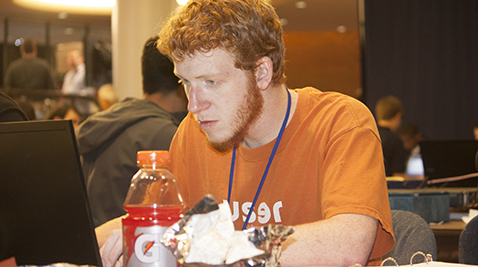LAUREL – Picture this: a major blizzard has knocked out communications throughout the state. Network security professionals are scrambling to bring relief to afflicted Marylanders, but a team of nefarious hackers have united to thwart their efforts.
Fortunately, it’s just a game, but the real-world implications are huge.
On Friday and Saturday, the CyberWatch Mid-Atlantic Collegiate Cyber Defense Competition turns Johns Hopkins Applied Physics Laboratory into a cyber battleground. This year’s theme is “Operation Cyber Blizzard.” Eight teams from colleges in Maryland, Virginia, West Virginia and Pennsylvania scramble to keep networks secure and ensure aid is administered to distressed — albeit fictional — citizens.

While the disaster may be fake, the students’ enemy is much more real. The college teams’ opposing hackers, or “Red Team,” is populated by computer security professionals using both hi-tech and low-tech methods.
As the red team launched sophisticated cyberattacks, one hacker walked unnoticed with a backpack into the “pit” where the school teams congregate during the competition. He seemed innocuous, but Charlie Frick, a Johns Hopkins cyber researcher and event volunteer, said that backpack was full of antennae gathering information about the defenders’ networks.
The scheme worked: No student noticed the intrusion.
The collegiate “White Teams”, all clustered around tables in a separate room from the red team, felt the pressure.
“It’s intense…you really have to multitask,” said Eileen Hindman, a senior at Radford University in Virginia.
The Red Team got deep into student networks quickly, further flustering the students.
“It’s a little hectic … I thought it would be smoother,” said Felix Guerrero, a junior at Towson University.
Some students’ efforts to maintain security bordered on paranoia. Keegan Moore, a sophomore from Laurel’s Capitol College interrogated an innocent volunteer to ensure he wasn’t a Red Team spy, only relenting when Frick verified his identity.
But members of the Red Team welcome the chance to switch sides after playing defense for most of their professional careers.
“I’m having a blast,” said Sean Pierce, a red team member and technical intelligence analyst for Virginia-based iSight Partners. “It’s fun and easy to attack. There’s no pressure.”
The complexity of the scenario leaves each college with a plethora of tasks to juggle. Networks have to be maintained and secured, but much like the real world, critical functions can’t just be shut down to deal with threats.
On top of that, there are phony elected and corporate officials to please. For example, Costis Toregas, a cybersecurity professor at The George Washington University, plays the role of a county executive who will grill team captains, demanding better performance in areas that teams may have neglected.
“Sometimes cybersecurity is contained within the technology silo,” Toregas explained. The simulation of added demands from government and business creates a more realistic environment and forces teams to learn “business acumen” that computer science classes may gloss over, he added.
The winning White Team will compete in a national tournament in San Antonio next month, but cybersecurity firms are eyeing potential hires from day one. During the competition weekend, a career fair gives students a chance to talk to employers one-on-one.
“We have a really unique perspective on the growing need for cyber talent,” said Jennifer Havermann, engineering manager for Raytheon, a security corporation and sponsor of the event. She added that competitions like this give students the opportunity to practice valuable skills that classrooms can’t teach.
Dustin Shirley, a member of Anne Arundel Community College’s team, agreed.
“This is the best learning tool for students,” Shirley said. The competition offers a chance to apply skills, whereas “in the classroom, you get PowerPointed to death.”
And despite the stress of the challenge, the atmosphere in the pit and the Red Team’s base is casual. The Red Team is blasting loud electronic music. Cans of energy drinks and snack food wrappers are scattered across White Team tables. Unallocated Space, a Severn-based technology education center, brought a modified Ms. Pac-Man machine that lets non-competitors play a number of classic arcade games.
For the student teams, camaraderie and communication are critical. Teams like Anne Arundel’s have spent months refining their techniques, and members said that team chemistry has formed naturally.
“We can sense stress … we help each other out,” Shirley said, grinning.


You must be logged in to post a comment.